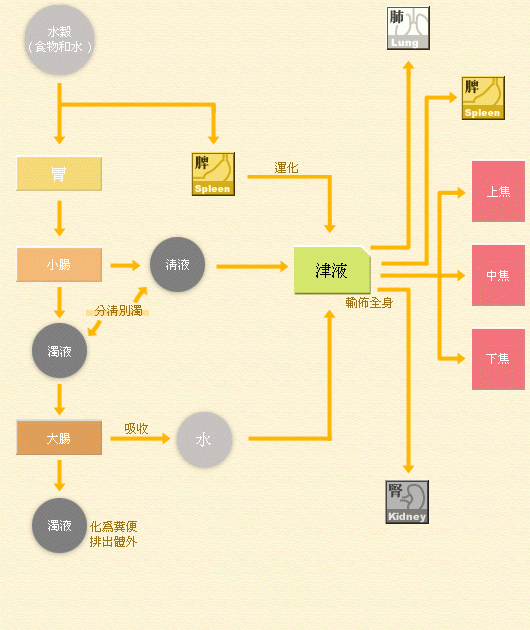中醫的津液
中醫理論中的津液是甚麼?
津液在中醫泛指一切正常的身體水液。除在脈中的血外,所有體內水液均屬於津液範疇,包括臟腑組織內的液體,以及其他分泌物,如胃液、腸液、唾液、關節液等。中醫的津液不能單純地視為水液,應當作體液的總稱,富含大量人體所需的有用物質。津液同氣、血一樣,是人體基礎物質,共同維持著生命活動。
津與液雖然同屬水液,都來源於飲食物,依賴脾胃運化而生成;但津和液在其性狀、功能、分佈等有所不同。一般來說,性質清稀,流動性大,主要散佈於體表皮膚、肌肉和孔竅等,同時滲入血脈,起到滋潤作用的,稱為津;性質較稠厚,流動性較小,灌注於骨節、臟腑、腦、髓等組織器官,起到濡養作用的,就稱之為液。津與液互相補充,互相轉化,故一般統稱為津液。
津液的生成、輸佈、排泄
津液代謝,即其生成、輸佈、排泄,過程複雜,主要通過肺、脾、腎、膀胱、三焦等臟腑相互配合完成。津液主要源於水谷(飲食物),進食後經胃的腐熟,分解後下傳小腸,經小腸分別清濁,吸收其中的水谷精微,向上輸送到脾,糟粕部分下傳大腸,大腸吸收其中殘餘水分,形成糞便,從肛門排出。
津液輸佈即傳輸與散佈,主要由脾、肺、腎、肝等相互配合,並以三焦為通道,綜合作用而完成。過程中使津液外達皮毛,內灌臟腑,散佈於全身。
- 脾氣散精: 脾通過運化作用,一方面將津液直接散佈周身,另一方面又上輸於肺,由肺的宣發肅降,把津液散佈全身而灌溉臟腑、形體、諸竅。
- 肺主行水: 通調水道,為水之上源。肺臟接收脾傳輸而來的津液後,一方面通過宣發作用將津液散佈於身體上部和體表,以潤澤肌膚,並將多餘的水分發為汗液而排出體外;另一方面通過肅降作用,肺將津液輸佈至腎臟及膀胱,以及人體下部,經由腎和膀胱的氣化作用,將多餘的水分化為尿液而排出體外。
- 腎主津液: 對津液輸佈起決定性作用。一方面,腎陽是人體陽氣之根本,具有蒸騰激發作用,推動各臟腑的功能活動;另一方面,腎本身也參與津液的傳輸,將清液上傳周身、濁液下排尿液。
津液主要通過呼氣、排汗、排尿、排便等,作為代謝過程的終結。使代謝廢物及多餘的水分透過不同途徑排出體外,推陳出新,維持人體體液的相對平衡。
- 出汗、呼氣: 肺氣宣發,將津液輸佈到體表皮毛,再被陽氣蒸騰形成汗液,經由毛孔排出,中醫又將汗毛孔稱為「氣門」。肺主呼吸,肺在呼氣時也帶走一些水分。
- 排尿: 尿液為津液代謝的最終產物。是在腎之氣化與膀胱的氣化作用相配合下,共同形成並排出體外。
- 排糞: 在大腸的水谷糟粕,即使形成糞便亦帶有少許津液。腹瀉時,大便中含水量增多,排出大量津液,易引起傷津病變。
津液代謝失常,主要是生成不足或消耗過多;其次是因津液的輸佈和排泄障礙,而致體內的津液滯留,形成濕、痰、飲、水等病理產物。中醫多責之於肺、脾、腎、肝及三焦等的氣機、氣化功能異常。認為任何原因致肺失宣肅、脾失健運、腎失氣化,均可引發尿少、浮腫、濕阻、痰濁、水飲諸証。另外,肝失疏泄,三焦氣機不利,氣滯水停,亦可釀成痰或痰氣、痰瘀交阻為病,如乳癖、梅核氣、瘰癘、臌脹、痰核等。
津液功能
津液是人體基礎物質之一,對維持生命不可缺少。概括地說,津液功能主要包括滋潤濡養、化生血液、調節陰陽、排泄廢物等方面。1. 滋潤濡養
津液以水為主體,具有很強的滋潤作用,富含多種營養物質。津液散佈於肌膚體表,滋潤皮毛肌膚,使肌膚毛髮光澤健康,肌肉豐滿而富有彈性。津液亦滋潤孔竅,如使眼瞼開合自如,鼻道通暢,口唇潤澤。津液滲入不同臟腑組織,滑利經脈,甚至滲入骨髓、脊髓及腦髓,以發揮其濡養滋潤作用。津液不足,濡養滋潤作用減退,可導致皮膚乾枯,肌肉鬆馳,毛髮枯乾,兩眼乾澀,口唇乾裂,咽喉乾燥,大便乾結,小便短少等。更甚者,因長期陰液虧虛,無力制約陽熱,而致虛熱內生,如出現潮熱,顴紅,盜汗、五心煩熱等症。
2.化生血液
津液經孫絡滲入血脈中,與營氣相合,成為化生血液的成分。若血液因故而驟減,津液亦可滲入脈內,以補充血液之不足。津液使血液充盈,並濡養和滑利血脈。因大汗、大吐、大瀉或高熱等而使津液急遽耗傷,循環血量亦隨之減少,古人稱之為津枯血少或津脫血竭。對於這些病人,切忌再施發汗之法,以免因汗出耗液而重傷其津。
3.調節陰陽
津液是陰精一部分,對於調節身體的陰陽平衡非常重要。人體根據體內和環境的改變,通過津液的自穩調節使機體保持常態,以適應外界變化。如寒冷季節或穿衣少時,皮膚汗孔閉合,津液外泄減少,以保溫御寒;溫熱季節或衣物多時,皮膚腠理開張,津液借發汗以散熱,由此調節體溫和平衡陰陽,以維持正常生命活動。
4. 排泄廢物
津液在其代謝過程中,將身體的代謝產物通過出汗、排尿等方式,不斷排出體外,以穩定內環境,有利體內臟腑正常運作。
對於津液不足的辨証,醫師會先區分「傷津」與「脫液」的變理變化。津較清稀,流動性大,易於補充,如炎夏多汗,或高熱耗傷而致口渴多飲;天氣乾燥時常見的口鼻、皮膚乾燥;大吐大瀉時出現的目陷等脫水表現,均屬「傷津」的表現。另外,液較稠厚,流動性小,一般不易耗損,一旦虧損,則難以迅速恢復。如熱病後期,或久病、重病之後,或年邁陰虧不復,所出現的舌紅無苔,唇舌乾燥不欲飲,形瘦肉脫,肌膚枯槁,甚至筋膜攣急,肌肉瞤動,手足震顫等,均屬「脫液」及陰虛風動的表現。
「傷津」與「脫液」兩者的治療用藥不盡相同。傷津病變重在調養肺、胃,多用味甘性寒之品,以取其甘寒生津之義,如沙參麥冬湯之類。脫液病重在調養肝、腎,多用味咸性涼之品,以取其咸涼增液之功,如大補陰丸之類。
 津液生成,輸佈,排泄
津液生成,輸佈,排泄參考文獻
- 張恩勤:《中醫基礎理論》上冊,上海 上海中醫藥大學出版社,1990。:
- 劉家義等:《中醫診斷學》,上海中醫藥大學出版社,1990。
- 北京中醫學院:《中醫學基礎》第一版,上海 上海科學技術出版社,1978。
- 印會河:《中醫基礎理論》,上海科學技術出版社,1985。
- 《黃帝內經素問》,北京人民衛生出版社,1978。
- 劉燕池:《中醫基礎理論問答》第一版,上海科學技術出版社,1982。
- Kaptchuk Ted J., Chinese Medicine : The Web That Has No Weaver, London: Rider, (2000).
- Williams Tom, Complete Chinese Medicine, Bath: Mustard, (1999).
作者 :
黨毅
北京中醫藥大學教授
中國協和醫科大學博士
首都保健營養美食學會副會長
編者:
鍾錦華
藥劑學學士 綜合中醫藥控股有限公司
翻譯:
Michael Yang


